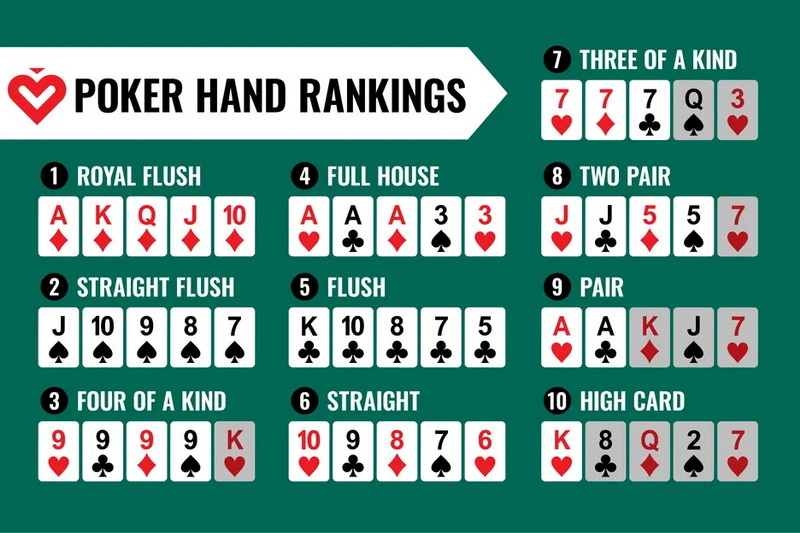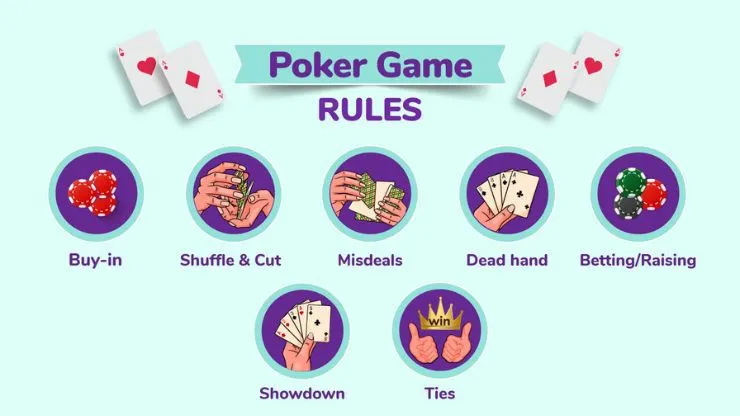Content Menu
● Introduction
● Understanding Poker Basics
>> The Objective of Poker
>> Poker Hand Rankings
>> The Poker Table Setup
>> Betting Rounds
>> Actions in Poker
● How to Play Texas Hold'em
>> Step-by-Step Guide
>> Example Hand
● Strategies for Beginners
>> Starting Hands Selection
>> Position Matters
>> Pay Attention to Opponents
>> Manage Your Bankroll
>> Practice Makes Perfect
● Common Mistakes Beginners Make
● Advanced Concepts for Further Learning
>> Bluffing Techniques
>> Reading Opponents
>> Game Theory Optimal (GTO) Play
>> Adjusting Your Strategy
● Conclusion
● Frequently Asked Questions
>> 1. What are blinds in poker?
>> 2. How many cards do players get in Texas Hold'em?
>> 3. What happens if there's a tie?
>> 4. Can I play poker online?
>> 5. What should I do if I'm unsure about my hand?
● Citations:
Introduction
Poker is one of the most popular card games in the world, enjoyed by millions for its blend of skill, strategy, and chance. Whether you're playing at home with friends or in a casino, understanding the basics of poker is essential for enjoying the game and increasing your chances of winning. This guide will introduce beginners to the fundamental aspects of poker, focusing primarily on Texas Hold'em, the most widely played variant.

Understanding Poker Basics
The Objective of Poker
The primary goal in poker is to win chips or money by either having the best hand at showdown or convincing other players to fold their hands. Players compete for a pot, which is the total amount of bets made during a hand. The game requires not only a good understanding of hand rankings but also an ability to read opponents and manage your chips effectively.
Poker Hand Rankings
Understanding hand rankings is crucial as it determines who wins at showdown. Here's a list of standard poker hands from highest to lowest:
1. Royal Flush: A, K, Q, J, 10 all of the same suit.
2. Straight Flush: Five consecutive cards of the same suit.
3. Four of a Kind: Four cards of the same rank.
4. Full House: Three of a kind plus a pair.
5. Flush: Five cards of the same suit, not in sequence.
6. Straight: Five consecutive cards of different suits.
7. Three of a Kind: Three cards of the same rank.
8. Two Pair: Two different pairs.
9. One Pair: Two cards of the same rank.
10. High Card: The highest card wins if no one has any of the above hands.
Knowing these rankings helps players make informed decisions about betting and folding throughout the game.
The Poker Table Setup
A typical poker table accommodates 2 to 10 players and includes:
- A dealer button that rotates clockwise after each hand.
- Blinds (small blind and big blind) that are forced bets to initiate action.
- Community cards dealt face-up in the center for all players to use.
The dealer button indicates which player acts last in each betting round, providing a strategic advantage.
Betting Rounds
In Texas Hold'em, there are four betting rounds:
- Pre-Flop: After players receive their two hole cards, they can call, raise, or fold.
- Flop: Three community cards are dealt face-up; another round of betting occurs.
- Turn: A fourth community card is dealt; players bet again.
- River: A fifth and final community card is dealt; the last betting round takes place.
Each round presents opportunities for players to assess their hands and make strategic decisions based on their position and the actions of others.
Actions in Poker
During each betting round, players can perform one of several actions:
- Check: Pass the action to the next player without betting.
- Call: Match the current bet.
- Raise: Increase the current bet.
- Fold: Withdraw from the hand and lose any bets made.
Understanding when to use each action is crucial for successful play.

How to Play Texas Hold'em
Step-by-Step Guide
1. Setup
- Players sit around a table with a standard 52-card deck.
- Each player receives two private cards (hole cards) that only they can see.
2. Blinds
- The player to the left of the dealer posts the small blind, and the next player posts the big blind.
3. Pre-Flop Betting
- Starting with the player left of the big blind, players decide to call, raise, or fold.
4. The Flop
- The dealer places three community cards face-up on the table.
- Another round of betting begins with the player left of the dealer.
5. The Turn
- A fourth community card is dealt face-up.
- Another round of betting follows.
6. The River
- A fifth community card is revealed.
- The final round of betting occurs.
7. Showdown
- If two or more players remain after the final betting round, they reveal their hands.
- The player with the best five-card hand wins the pot.
Example Hand
To illustrate how a hand plays out in Texas Hold'em:
1. You are dealt an Ace and King of hearts (A♥ K♥).
2. The blinds are $1 (small blind) and $2 (big blind).
3. You decide to raise to $6 pre-flop; everyone folds except one player who calls your bet.
4. The flop comes 10♥ J♥ Q♣ (three community cards).
5. You have a flush draw and an open-ended straight draw; you decide to bet $10.
6. Your opponent calls your bet.
7. The turn is 9♥; you now have a straight flush!
8. You bet $20; your opponent raises you to $50.
9. You go all-in for $100 total; your opponent calls you.
10. At showdown, you reveal your straight flush while your opponent shows two pairs.
In this example, strategic betting and understanding hand strength led you to win a substantial pot.
Strategies for Beginners
Starting Hands Selection
Choosing which hands to play is critical for success:
- Play strong starting hands like high pairs (Aces or Kings) and high suited connectors (like Ace-King).
- Avoid playing weak hands that have little chance of improving; this often leads to unnecessary losses.
Position Matters
Your position at the table affects your strategy:
- Being in a late position allows you to see how others act before making your decision.
- Use this advantage to play more aggressively when others show weakness; conversely, be cautious when acting early in a round.
Pay Attention to Opponents
Observing your opponents' behavior can give you insights into their hands:
- Look for patterns in their betting and try to determine what type of hands they might be holding based on their actions throughout previous rounds.
Manage Your Bankroll
Set limits on how much you are willing to spend:
- Avoid going all-in unless you have a strong hand or are confident in your read on opponents; managing your bankroll effectively ensures that you can continue playing without risking everything on one hand.
Practice Makes Perfect
The more you play, the better you will understand nuances:
- Consider playing free online games or low-stakes tables to gain experience without significant risk; this will help build your confidence and skill level over time.
Common Mistakes Beginners Make
1. Playing Too Many Hands: New players often get excited and play too many weak hands instead of waiting for stronger ones.
2. Overvaluing Weak Hands: Beginners may think they have strong hands when they don't recognize better potential hands on board.
3. Failing to Consider Position: Ignoring where they sit at the table can lead beginners into making poor decisions regarding when to bet or fold.
4. Ignoring Pot Odds: Understanding pot odds—comparing potential winnings against possible losses—is essential for making informed decisions about whether to call or fold bets.
5. Not Paying Attention to Opponents: Focusing solely on their own cards rather than observing opponents can lead beginners to miss valuable information that could influence their decisions.
Advanced Concepts for Further Learning
Once you've mastered basic strategies, consider exploring more advanced concepts:
Bluffing Techniques
Bluffing is an essential part of poker strategy but should be used sparingly:
- Understand when it's appropriate based on board texture and opponents' tendencies.
Reading Opponents
Learn how to read physical tells (if playing live) or betting patterns (if playing online):
- This skill can significantly enhance your ability to make informed decisions during gameplay.
Game Theory Optimal (GTO) Play
Advanced players often study GTO strategies:
- This approach focuses on balancing your play so that opponents cannot exploit any weaknesses in your strategy.
Adjusting Your Strategy
Adaptability is key:
- Be willing to change your approach based on table dynamics and specific opponents' tendencies as games progress.
Conclusion
Poker is an exciting game that combines strategy with psychology and chance. By understanding basic rules, hand rankings, and strategies, beginners can enjoy playing while developing their skills over time. Remember that practice is key; take your time learning and don't rush into high-stakes games until you're comfortable with your abilities.
As you continue playing poker, keep refining your skills by studying advanced strategies and learning from both wins and losses at the table.

Frequently Asked Questions
1. What are blinds in poker?
Blinds are forced bets made by players before any cards are dealt; they create action in each hand.
2. How many cards do players get in Texas Hold'em?
Players receive two private cards (hole cards) and use five community cards shared by all players.
3. What happens if there's a tie?
If two players have identical hands at showdown, they split the pot equally.
4. Can I play poker online?
Yes, many platforms offer online poker games where you can play for free or real money.
5. What should I do if I'm unsure about my hand?
If you're uncertain about your hand's strength compared to others', it's often safer to fold rather than risk losing more chips.
Citations:
[1] https://www.free-ebooks.net/games/Learn-How-to-Play-Poker-Like-a-Pro/pdf
[2] https://www.linkedin.com/pulse/how-play-poker-beginners-ultimate-guide-krishnapadamitsolution
[3] https://www.reddit.com/r/reddeadredemption/comments/9plj4w/a_guide_on_how_to_play_poker_for_beginners/
[4] https://www.instructables.com/Learn-How-to-Play-Poker!/
[5] https://www.youtube.com/watch?v=pSRGErzzIo4
[6] https://news.williamhill.com/casino-guides/how-to-play-poker/
[7] https://upswingpoker.com/poker-rules/
[8] https://www.pokernews.com/poker-rules/
































